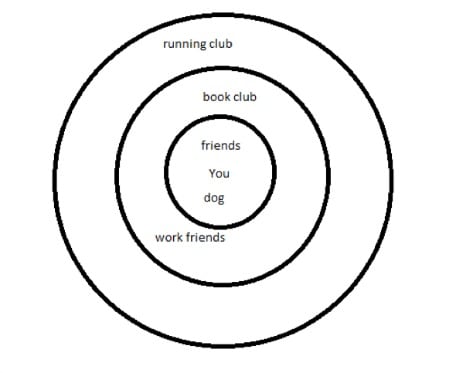Why Pets Are So Important for People with Mental Illness
As pet parents, we all know how important animals are to our own physical and mental wellbeing. In fact, research shows that pets have a way of keeping people and communities strong. But a recently-released study has taken this one step further, looking at how pets can potentially benefit people suffering from serious mental illnesses like bipolar disorder and schizophrenia.
Researchers from the University of Manchester and the University of Southampton in England interviewed 54 people who had been diagnosed with long-term mental health problems. During the interviews, the participants mapped their “personal networks” using a diagram consisting of three concentric circles.
Here’s an example of a network map that I’ve created as an example (it is not used in the study):

In the inner circle are the people, hobbies, pets, activities, objects, etc. that are most important to you. In the second circle are those that are somewhat less important, and in the outer circle are those that are still important, but less so than those in the other two circles.
The study found that 60% of the participants with pets put their pet in the central circle, 20% put them in the middle circle, 12% put them in the outer circle, and only 8% did not include them in any of the circles. While these results are impressive, what touched me most about this paper were some of the participants’ quotes about their pets:
- “You know, so in terms of mental health, when you just want to sink into a pit and just sort of retreat from the entire world, they force me, the cats force me to sort of still be involved with the world.” – Study participant, owner of two cats
- “When he comes and sits up beside you on a night, it’s different, you know, it’s just, like, he needs me as much as I need him, sort of thing.” – Study participant, dog owner
- “They [pets] don’t look at the scars on your arms, or they don’t question things, and they don’t question where you’ve been.” – Study participant, dog owner
- “If I didn’t have my pets I think I would be on my own…You know what I mean, so it’s…it’s nice to come home and, you know, listen to the birds singing.” – Study participant, owner of two birds
- “That surprised me, you know, the amount of people that stop and talk to him, and that, yeah, it cheers me up with him. I haven’t got much in my life, but he’s quite good, yeah.” – Study participant, dog owner
The authors of the study concluded that pets were beneficial in helping people suffering from mental illness in many different ways, including:
- Developing routines
- Providing a sense of control, security and continuity
- Providing distractions
- Encouraging exercise
- Reducing the social stigma of mental illness
Most importantly, pets “provided participants with a seemingly deep and secure relationship, often not available elsewhere within the network or wider community,” according to the study.
I’m not too surprised since that’s the role that pets play in most of our lives, regardless of what our network maps look like.
